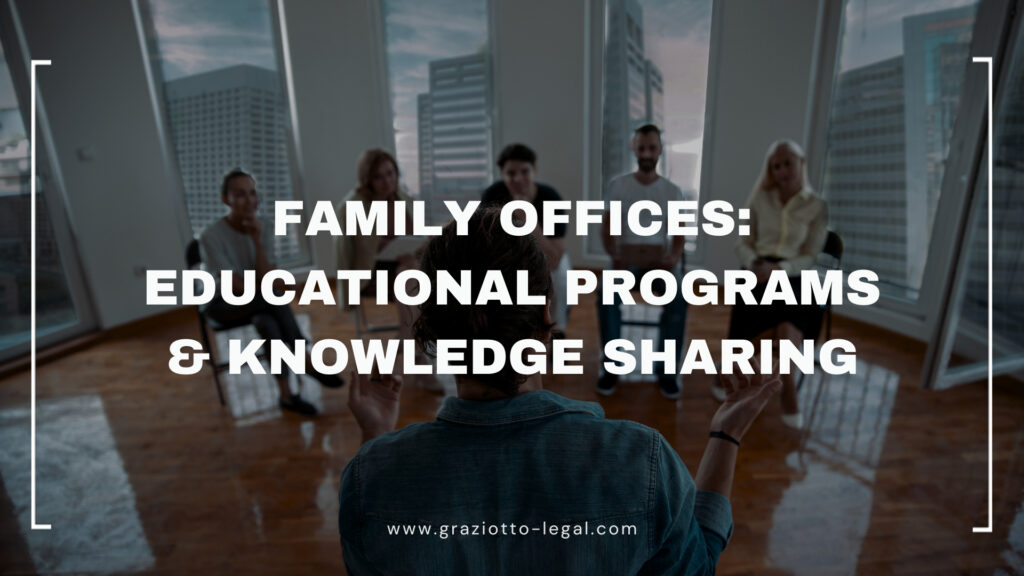

Since 2010, the Global Law Experts annual awards have been celebrating excellence, innovation and performance across the legal communities from around the world.
posted 1 year ago
Educational programs and knowledge sharing are pivotal components in a family office’s service offering. These initiatives ensure that family members are informed, engaged, and capable of making responsible decisions regarding their wealth and other aspects of family governance.
In a family office context, the need for education extends beyond traditional financial literacy to encompass aspects like family values, legacy stewardship, leadership development, and more.
This sub-section elaborates on the essential educational programs and how knowledge sharing can be cultivated within the family office environment.
Understanding the educational needs of family members is the starting point in designing relevant and effective educational programs. This involves recognizing the diverse needs across different generations, roles, and responsibilities within the family.
Identifying the gaps in knowledge, skills, or understanding that may exist among family members enables the family office to tailor education initiatives to specific needs.
Financial literacy is foundational for family members who are engaged with the family office. Customized programs may cover topics like investment principles, risk management, tax planning, estate planning, and more.
Financial literacy enhances the family members’ ability to participate in decision-making and steward the family’s wealth responsibly.
Governance and leadership education programs are designed to prepare family members for roles within family governance structures like family councils, boards, or committees.
These programs might include training in leadership skills, communication, conflict resolution, strategic planning, and the legal and ethical aspects of governance.
Governance and leadership education in a family office context is a complex undertaking that requires a well-structured approach. This expansion delves deeper into the components of this critical aspect of education:
An initial phase in governance and leadership education is defining the various roles and responsibilities within the family’s governance structure.
Clarity in roles helps family members understand their specific duties and the expectations attached to their positions within family councils, boards, committees, or other governing bodies.
Leadership skills are essential for family members who take on governance roles. Customized training in leadership development might include modules on vision setting, strategic thinking, emotional intelligence, conflict resolution, negotiation, and other soft skills that are pivotal in leading a diverse and multifaceted family organization.
Family members engaged in governance must understand the legal and ethical obligations related to their roles. Comprehensive education on legal compliance, fiduciary duties, ethics, transparency, and accountability sets the groundwork for responsible stewardship.
Effective communication and collaboration are key to successful governance. Tailored training in communication skills, collaboration tools, and strategies for building consensus ensures that family members can work together efficiently and maintain harmonious relationships.
Mentoring and coaching can be valuable components of governance and leadership education. Experienced family members or external experts providing one-on-one coaching and guidance can foster the development of leadership competencies in a more personalized and impactful way.
Practical exercises like case studies and simulations allow family members to apply their learning in simulated real-world scenarios. These experiential learning activities can make governance and leadership education more engaging and effective.
Ongoing assessment and feedback mechanisms enable continuous improvement in governance and leadership capabilities. Regular evaluations, feedback sessions, and personal development plans ensure that family members are supported in their ongoing growth and development in these critical roles.
The comprehensive nature of governance and leadership education reflects the complexity of these roles within a family office context.
By covering various aspects from defining roles to skill development, legal and ethical training, communication strategies, mentoring, practical exercises, and continuous assessment, family members are equipped with the knowledge and competencies they need to lead and govern effectively.
A distinct aspect of family office education is nurturing an understanding and appreciation of the family’s values, history, and legacy. This may involve storytelling, family history documentation, values workshops, and other creative approaches that connect family members to their shared heritage.
Generational education recognizes the different needs and perspectives of various generations within the family. Tailoring education to the specific interests, learning styles, and concerns of different generations fosters engagement and builds bridges between family members.
For families engaged in philanthropy, education on effective philanthropic strategies, impact assessment, legal compliance, and ethical considerations is essential. Philanthropy education may also encourage younger family members to become involved in charitable activities aligned with family values.
The use of technology can enhance the delivery of educational programs. Platforms that support e-learning, webinars, virtual meetings, and collaboration tools can facilitate ongoing learning and knowledge sharing, especially when family members are geographically dispersed.
Embracing technology in the design and delivery of educational programs and knowledge sharing is a crucial element in a modern family office. Let’s explore how technology can be leveraged to enhance educational outcomes:
E-Learning platforms allow for the creation and dissemination of digital educational content tailored to the family’s specific needs. These platforms can offer self-paced learning modules, video tutorials, quizzes, and interactive content, enabling family members to learn at their convenience and pace.
The use of webinars and virtual workshops can bring family members together, regardless of geographical location, to engage in live interactive sessions. These can be used for expert-led sessions, panel discussions, and collaborative workshops on various topics of interest to the family.
Tools that facilitate collaboration, such as shared document repositories, discussion forums, and project management platforms, can promote ongoing knowledge sharing and collaboration among family members. These platforms can serve as central hubs for sharing insights, documents, best practices, and more.
Data analytics can be employed to track individual learning progress, preferences, and challenges. By analyzing this data, educational programs can be further customized to address specific learning needs and preferences, leading to more effective and engaging learning experiences.
Given the sensitive nature of information within a family office, the use of technology must be coupled with robust security measures. Ensuring data privacy and safeguarding confidential information must be integral components of the technology strategy within the educational framework.
Education within a family office must cater to a diverse group of learners, including different generations, backgrounds, and educational levels. An inclusive learning environment recognizes and addresses these differences through:
Designing educational programs that recognize the different learning styles and preferences of various generations can enhance engagement. This might include using a mix of traditional learning methods for older generations and more tech-savvy approaches for younger family members.
Recognizing the different educational backgrounds and competencies of family members ensures that the content is neither too simplistic nor overly complex. A well-balanced approach can cater to different educational levels without alienating or overwhelming participants.
Understanding the cultural nuances and sensitivities within the family and reflecting them in the educational content creates a more welcoming and resonant learning experience.
Creating a learning environment where all family members feel encouraged to participate, ask questions, and voice their opinions fosters a more collaborative and enriching educational experience.
Educational programs and knowledge sharing are essential components of a family office’s services, extending beyond mere financial literacy to encompass governance, leadership, values, technology, inclusivity, and more.
The family office must craft a nuanced educational strategy that recognizes the diverse needs and dynamics within the family. Employing a mix of traditional and technological tools, addressing various learning styles, fostering a culture of continuous learning, and ensuring an inclusive learning environment are key to success.
With tailored education initiatives, family members are empowered to make informed decisions, engage in governance, align with family values, and contribute to the family’s legacy.
In essence, educational programs and knowledge sharing are not just about transferring knowledge; they are about building connections, fostering responsible stewardship, enhancing collaboration, and strengthening the fabric of the family.
The sub-section on educational programs and knowledge sharing offers insights into the critical role of education within a family office context and the strategies to deliver effective and tailored education to family members.
From financial literacy to governance, technology, and inclusivity, the detailed exploration underscores the importance of education as a central pillar in building a cohesive and engaged family unit within the family office framework.
For more in-depth information you can consult my latest book «The Global Manual for Family Offices», Volume 1, Chapter 3.4.2, Pg. 220.
http://amazon.com/author/fulvio-graziotto
Stay informed with the latest legal developments at Global Law Experts
Author


No results available
posted 22 minutes ago
posted 45 minutes ago
posted 4 days ago
posted 4 days ago
posted 4 days ago
No results available
Find the right Legal Expert for your business
Global Law Experts is dedicated to providing exceptional legal services to clients around the world. With a vast network of highly skilled and experienced lawyers, we are committed to delivering innovative and tailored solutions to meet the diverse needs of our clients in various jurisdictions.

Thinking of buying property in Brazil? Start with a full legal safety net.
✔️ Check title and ownership history
✔️ Verify no debts or disputes
✔️ Confirm zoning and permits.
#BrazilProperty #RealEstateInvesting #LegalDueDiligence #ForeignInvestment #PropertyLaw #GlobalRealEstate #InvestmentRisk #BrazilLaw

When your international business faces financial distress, quick action is key! 🔑 Negotiating with creditors, restructuring debt, and understanding insolvency laws can help regain stability. Global Law Experts is here to guide you through your options.
🌍Explore the details on our website.
🔗Link in bio
#GlobalLawExperts #CommercialLaw #BusinessLaw #LegalAdvice #BusinessGrowth #LegalTips #BusinessStrategy #LegalCompliance #Law #LegalKnowledge #LegalAwareness #Law101 #LegalEducation #IntellectualProperty

Thinking of buying property in Brazil? Don’t stop at the contract or key handover. Make sure the title is officially registered before calling it yours.
#BrazilRealEstate #PropertyLaw #GlobalInvestment #ForeignInvestors #LegalTips #DueDiligence #RealEstateRegistration #SecureInvestment

Getting a termination notice right now? Know your rights. Valid reason, fair process, proper notice they matter. Don’t let a bad dismissal walk away without accountability.
#EmploymentLaw #WorkerRights #Termination #LaborLaw #FairDismissal #WorkplaceJustice #LegalAwareness #GlobalWorkforce

Running a business is hard enough — lawsuits shouldn’t make it harder. 🚫 Protect your business with the right legal strategies and expert tools from Global Law Experts. Let’s secure your future together! 💼
🌍Explore the details on our website.
➡️www.globallawexperts.com
#GlobalLawExperts #CommercialLaw #BusinessLaw #LegalAdvice #BusinessGrowth #LegalTips #BusinessStrategy #LegalCompliance #Law #LegalKnowledge #LegalAwareness #Law101 #LegalEducation #IntellectualProperty #Infringed #Ecommerce #LegalBranding
Global Law Experts is dedicated to providing exceptional legal services to clients around the world. With a vast network of highly skilled and experienced lawyers, we are committed to delivering innovative and tailored solutions to meet the diverse needs of our clients in various jurisdictions.

Thinking of buying property in Brazil? Start with a full legal safety net.
✔️ Check title and ownership history
✔️ Verify no debts or disputes
✔️ Confirm zoning and permits.
#BrazilProperty #RealEstateInvesting #LegalDueDiligence #ForeignInvestment #PropertyLaw #GlobalRealEstate #InvestmentRisk #BrazilLaw

When your international business faces financial distress, quick action is key! 🔑 Negotiating with creditors, restructuring debt, and understanding insolvency laws can help regain stability. Global Law Experts is here to guide you through your options.
🌍Explore the details on our website.
🔗Link in bio
#GlobalLawExperts #CommercialLaw #BusinessLaw #LegalAdvice #BusinessGrowth #LegalTips #BusinessStrategy #LegalCompliance #Law #LegalKnowledge #LegalAwareness #Law101 #LegalEducation #IntellectualProperty

Thinking of buying property in Brazil? Don’t stop at the contract or key handover. Make sure the title is officially registered before calling it yours.
#BrazilRealEstate #PropertyLaw #GlobalInvestment #ForeignInvestors #LegalTips #DueDiligence #RealEstateRegistration #SecureInvestment

Getting a termination notice right now? Know your rights. Valid reason, fair process, proper notice they matter. Don’t let a bad dismissal walk away without accountability.
#EmploymentLaw #WorkerRights #Termination #LaborLaw #FairDismissal #WorkplaceJustice #LegalAwareness #GlobalWorkforce

Running a business is hard enough — lawsuits shouldn’t make it harder. 🚫 Protect your business with the right legal strategies and expert tools from Global Law Experts. Let’s secure your future together! 💼
🌍Explore the details on our website.
➡️www.globallawexperts.com
#GlobalLawExperts #CommercialLaw #BusinessLaw #LegalAdvice #BusinessGrowth #LegalTips #BusinessStrategy #LegalCompliance #Law #LegalKnowledge #LegalAwareness #Law101 #LegalEducation #IntellectualProperty #Infringed #Ecommerce #LegalBranding
Send welcome message